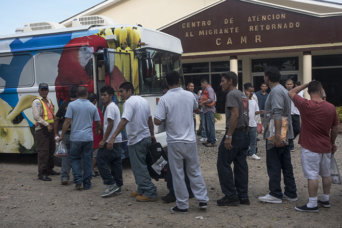- About
- Topics
- Picks
- Audio
- Story
- In-Depth
- Opinion
- News
- Donate
- Signup for our newsletterOur Editors' Best Picks.Send
Read, Debate: Engage.
| located: | Honduras, USA |
|---|---|
| editor: | Vanessa Ellingham |
Central Americans seeking asylum in the USA are being denied the opportunity to make genuine claims for asylum, according to a new report released by Human Rights Watch.
The report, titled “‘You Don’t Have Rights Here’: US Border Screening and Returns of Central Americans to Risk of Serious Harm,” documents the 'rapid-fire' methods used to screen asylum applicants which do not provide ample opportunity for the applicants' situations to be properly assessed.
The practice follows a trend which we have also seen in Australia: there asylum seekers have been screened via teleconference while still at sea after making the arduous journey from Sri Lanka. In some cases, applicants were only asked four quick questions via teleconference before being turned back towards their persecutors.
The Human Rights Watch report was based on interviews conducted with Hondurans who had been sent back after their applications were denied, as well as with people in detention and using data obtained from the US's Freedom of Information Act.
"Hondurans who fled extortion and threats from brutal gangs faced fast-track screening procedures in the US that resulted in their deportation without a genuine opportunity to claim asylum. Several of those returned told Human Rights Watch that after their return, they were afraid to leave their houses, fearing for their lives," the report reads.
“The US government’s fast-track screening of migrants is ignoring the very real fears of the people arriving at the border,” says Clara Long, US immigration researcher at Human Rights Watch and author of the report. “In its frenzy to stem the tide of migrants from Central America, the US is sending asylum seekers back to the threat of murder, rape, and other violence.”
And the frenzy is not limited to the USA. Aside from the ongoing "stop the boats" face in Australia, this week police across the EU launched a two-week manhunt for "irregular" migrants - those living in the EU without permission to stay.
They plan to stake out 'hiding spots' like bus depots, highways and, of course, border crossings, in what the police say is an attempt to crack down on human trafficking rings. However rights groups aren't convinced, saying it is a crack down on the most vulnerable people in European societies.
In Berlin activists were seen handing out flyers on public transport to warn those at risk of deportation.
Image: Returned migrants board a bus to Tegucigalpa in front the Center for Returned Migrants, San Pedro Sula airport, Honduras, September 2014. © 2014 Stephen Ferry for Human Rights Watch
